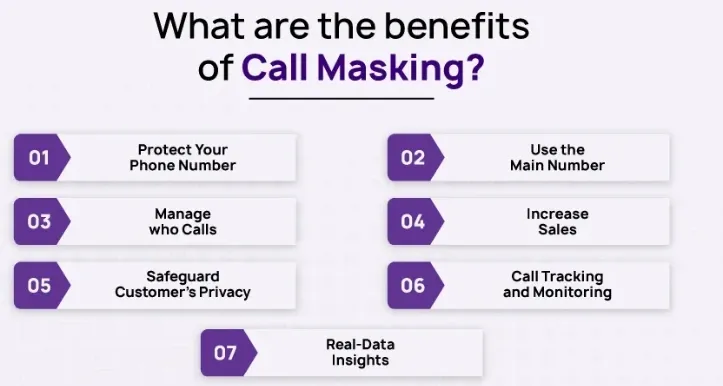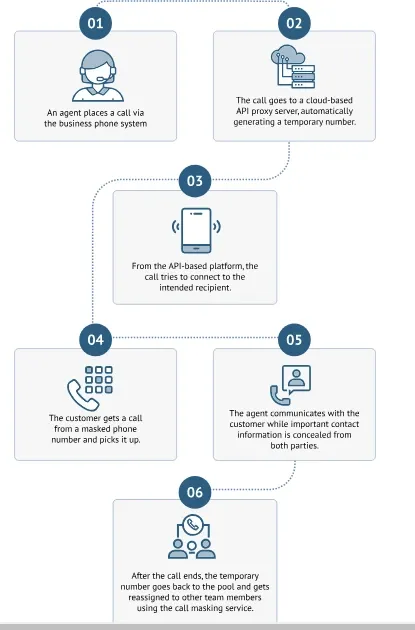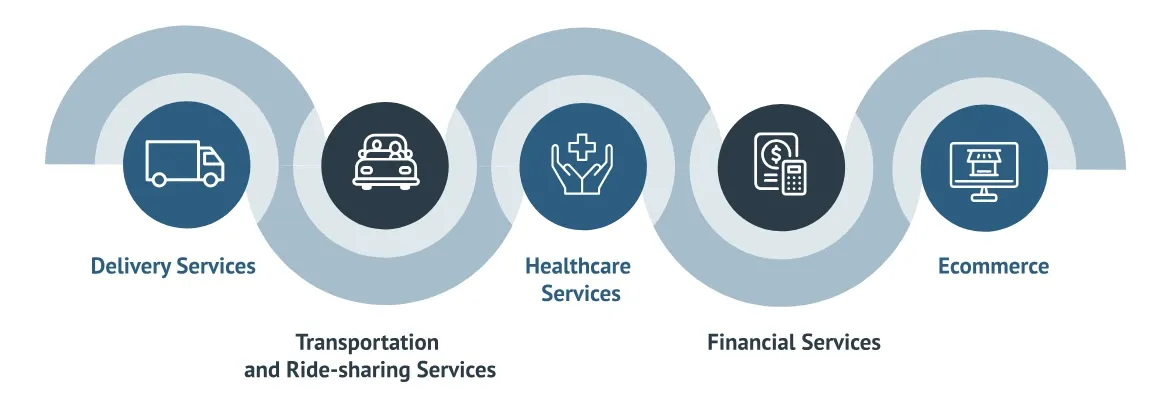What is Call Masking?
Call Masking is a technology that hides the real phone numbers of both the caller and the receiver. Instead of seeing the actual numbers, both parties see a temporary or virtual number. This ensures that the real contact details remain private.
Benefits of Call Masking
Call Masking service offers several key benefits that enhance both security and user experience.
Privacy Protection
One of the biggest advantages of Call Masking is privacy protection. Imagine you're a delivery agent who needs to call a customer to confirm a delivery. With Call Masking service, neither your number nor the customer’s number is exposed. This protects both of you from unwanted follow-ups, spam, or misuse of personal information.
Enhanced Security
Call Masking adds a layer of security that reduces the risk of fraud. Suppose you run a ride-hailing service. Your drivers and passengers connect via masked numbers, so their real contact details are not shared. This prevents anyone from using the information for fraudulent activities, like impersonation or unauthorized access.

Improved Customer Experience
Call Masking ensures smooth communication without the worry of sharing personal numbers. Think about a customer calling a support agent. With Call Masking service, the customer feels secure knowing their number isn’t exposed, leading to a more positive interaction. This builds trust and encourages customer loyalty.
Professional Image
Maintaining a professional image is crucial for businesses. With Call Masking, you can ensure that all communications are routed through official channels, like a company’s main number, even if the call is handled by different agents. This consistency makes your business appear more reliable and organized.
How Call Masking Works
Understanding how Call Masking works can help you see its value for your business.
The Process
First, a call is made from one party to another. Before it reaches the receiver, the Call Masking service steps in. It replaces the real phone number with a temporary or virtual number. The call is then connected through this masked number. The caller and receiver communicate as usual, but they only see the masked number, not each other’s real contact information.
Key Technologies Involved
Several technologies power Call Masking like:
- One key technology is a virtual phone number system that generates temporary numbers for calls.
- Another is call routing, which ensures that the call is correctly connected through the masked number.
- Finally, there’s call logging, which records the interactions without revealing the actual phone numbers.

Step-by-Step Flow of a Masked Call
The step-by-step flow of call masking service is as follows:
Step 1
The caller dials the recipient’s number.
Step 2
The Call Masking system intercepts the call.
Step 3
The system generates a temporary number and replaces the caller’s real number with it.
Step 4
The call is routed through the masked number to the recipient.
Step 5
The recipient answers the call, seeing only the masked number.
Step 6
After the call ends, the temporary number is deactivated.
Use Cases for Call Masking
Call Masking app is useful in various situations where privacy and security are priorities.
E-commerce and Delivery
In e-commerce, Call Masking ensures that delivery agents and customers communicate without sharing their real numbers.
For example, a customer can call a delivery agent to check the status of their package, and the agent can respond, all while their real numbers stay hidden. This reduces the risk of harassment or unwanted follow-up calls.

Healthcare
Healthcare providers use the Call Masking app to protect patient confidentiality. Call Masking ensures that neither party’s real number is revealed when doctors or nurses need to contact patients.
This is especially important in maintaining trust and confidentiality in sensitive medical situations.
Ride-Hailing Services
Ride-hailing companies like Uber and Ola use the Call Masking app to keep drivers’ and passengers’ details private.
A passenger can contact the driver through a masked number to coordinate the pickup without revealing their number. This not only protects privacy but also enhances security during the ride.
Implementing Call Masking in Your Business
Integrating Call Masking into your business is straightforward and offers immediate benefits.
Steps to Integrate Call Masking
First, choose a service provider that offers Call Masking service. Next, work with them to set up the system within your communication infrastructure. This may involve linking your phone lines or using an API to manage the masked numbers. Finally, train your staff on how to use the system and monitor its effectiveness.
Important Considerations
When implementing the Call Masking app, consider the volume of calls your business handles and ensure the system can manage it without issues. Also, think about the legal requirements, especially if you operate in industries with strict privacy regulations.
Suggested Reading: Virtual Call Center
Tools and Services
Many communication platforms offer Call Masking service as part of their services. Some popular options include Twilio, Nexmo, and Plivo. These tools provide easy integration, reliable performance, and customizable options to suit your business needs.
Frequently Asked Questions (FAQs)
How does call masking work?
Call masking works by intercepting a call, replacing the real phone numbers with temporary ones, and routing the call through these masked numbers. Both parties communicate without seeing each other’s actual phone numbers.
Why is call masking important for businesses?
Call masking is important for businesses as it protects customer privacy enhances security, and maintains a professional image by keeping real phone numbers hidden during communication.
Which industries use call masking?
Industries like e-commerce, healthcare, and ride-hailing services commonly use call masking to protect the privacy of customers, patients, and service providers during communication.
Can call masking be integrated into existing business systems?
Yes, call masking can be easily integrated into existing business communication systems through service providers offering APIs or dedicated platforms, allowing seamless masking of numbers during calls.
Does call masking affect call quality?
No, call masking does not affect call quality. It simply replaces the visible phone number with a masked one, ensuring clear communication while protecting privacy.
